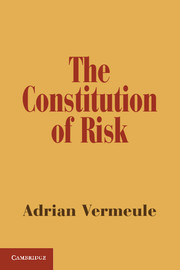Book contents
- Frontmatter
- Contents
- Epigraph
- Introduction
- Part I Theory
- Part II Applications
- 3 The Framers’ Self-Defeating Precautions
- 4 The Risks of Impartiality: On Judging in One’s Own Cause
- 5 The Risks of Deliberation: Second Opinions
- 6 The Risks of Expertise: Political Administration and Expert Groupthink
- Conclusion Constitutional Rulemaking Without a Style
- Acknowledgments
- Index
- References
3 - The Framers’ Self-Defeating Precautions
Published online by Cambridge University Press: 05 June 2014
- Frontmatter
- Contents
- Epigraph
- Introduction
- Part I Theory
- Part II Applications
- 3 The Framers’ Self-Defeating Precautions
- 4 The Risks of Impartiality: On Judging in One’s Own Cause
- 5 The Risks of Deliberation: Second Opinions
- 6 The Risks of Expertise: Political Administration and Expert Groupthink
- Conclusion Constitutional Rulemaking Without a Style
- Acknowledgments
- Index
- References
Summary
Having laid out competing views on the constitutional regulation of political risk, and given the main lines of the argument for the mature position, the next four chapters turn to applications. The case studies are pitched both at the macro-level of large-scale constitutional structures, in this chapter, and at the micro-level of particularly critical constitutional principles, rules, and legal doctrines, in Chapters 4, 5, and 6.
This chapter explains, critiques, and reformulates James Bryce’s brilliant large-scale account of the American constitutional order in his neglected classic of constitutional and political analysis, The American Commonwealth, first published in 1888. Bryce argues that Madison’s precautionary strategy for channeling and containing majoritarian opinions and passions, by means of complex constitutional structures, had perverse results; it strengthened rather than containing the force of public opinion. The Madisonian strategy, shared by other framers, provides a large-scale illustration of self-defeating precautions against political risks, here the risk of populism. The power of mass opinion in America results in part from the very safeguards the framers put into place against it.
The upshot is that in America, public opinion rules. As a normative matter, the results are mixed; once in place, government by public opinion sets both a lower bound and an upper bound on the performance of the American democracy, ensuring that it performs tolerably well but also preventing it from performing better still. Although the precautionary Madisonian strategy eventually produced a tolerable political regime, it did so fortuitously, by causal pathways that Madison and other framers failed to foresee. Ironically, precautionary constitutionalism, often justified as a hedge against the limits of the knowledge and foresight of constitutional rulemakers, itself produces unforeseen and possibly damaging results. Unforeseen consequences are on all sides of the issues; they can result from the very precautions taken to guard against them.
- Type
- Chapter
- Information
- The Constitution of Risk , pp. 91 - 106Publisher: Cambridge University PressPrint publication year: 2013
References
- 35
- Cited by

